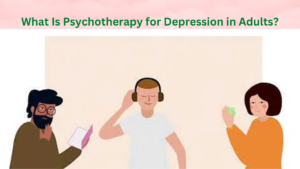
Depression is popularly defined as a mental health condition that alters one’s mood. Hence, psychotherapy is required for treatment. And that is the reason we are discussing the topic of psychotherapy for depression in adults. Moving further, depression is characterized by feelings of hopelessness and sadness. Therefore, if such feelings persist for a long time, it could lead to physical symptoms such as a lack of interest in daily activities, sleeping, and eating problems, among others. In addition, no one wishes to stay depressed. Hence, help is needed. The major sought-after help (after medication) to treat depression is psychotherapy. Therefore, in this article, we will be discussing psychotherapy for depression in adults and all it entails.
What Are the 3 Basic Approaches to Treating Depression?
When it comes to psychotherapy for depression in adults, it is good to understand that there are different available approaches. Nevertheless, there are 3 basic psychotherapy approaches for treating depression. They are:
- Interpersonal Therapy
- Cognitive Behavioral Therapy
- Psychodynamic Therapy
Interpersonal Therapy
This therapy works by exploring significant interpersonal relationships that could have affected the mental health of a depressed individual. It is of different types.
Cognitive Behavioral Therapy
This is another basic psychotherapy for depression in adults. In this therapy, faulty thinking is believed to be the underlying cause of emotional disturbances that causes depression. Therefore, the theory helps a client to recognize their faulty thoughts, change them and develop coping skills.
Psychodynamic Therapy
In this therapy, clients are helped to reflect more on themselves and also pay attention to the causes of unwanted feelings. This psychotherapy for depression in adults is based on the principle that past experiences contribute to depressive feelings and behaviors.
What Kind of Therapy Do People with Depression Need?
Imagine for some days; you have been experiencing stomach aches. Therefore, you decided to go see a doctor. When the doctor saw you, she asked a series of questions and wrote some tests to be carried out. The tests were carried out, and the best medical approach to solve your stomach ache problem was chosen. In the same manner, there are different psychotherapy approaches for treating depression in adults. Hence, the kind of therapy used on a depressed client is based on the therapist’s diagnosis.
No one psychotherapy for depression in adults can be used to treat all depressed individuals. Not at all. Nevertheless, it is the job of the therapist to know the specific therapy to utilize. In addition, it is important to know that sometimes, two therapies can be blended and utilized.
What Therapy Is Most Successful in Treating Depression?
In providing an answer to this question, here is an important thing to note. There are different types of depression. Some of these are:
- Major depressive disorder
- Dysthymia
- Bipolar disorder
- Postpartum depression
- Psychotic depression, etc.
Furthermore, there is no one therapy that has been most successful in treating all of these types of depression. However, for major depressive disorder, the most widely recorded psychotherapy that has been very effective is CBT. Cognitive Behavioral Therapy (CBT) is based on the theme that one’s unhealthy beliefs and thoughts often cause behavioral issues. Looking at some of the symptoms of major depressive disorder, cognitive behavioral therapy would work well as a sufficient treatment. This is because unhealthy thoughts are pervasive in most of the symptoms. These symptoms include:
- Feeling hopeless
- Feeling worthless
- Loss of interest
- Worries
- Lack of concentration, among others.
Therefore, when it comes to treating the major depressive disorder, the most successful psychotherapy for depression in adults is cognitive behavioral therapy.
What Therapy Helps Clients with Depression?
Moving forward, as mentioned earlier, there are different psychotherapy for depression in adults that are helpful. The most important thing is choosing the best therapy that is effective in treating a specific depression type. And the decision to choose the most suitable therapy hinges on the therapist. Let’s quickly look at some types of depression and the best psychotherapy for them.
- Major Depressive Disorder (MDD): Just as earlier mentioned, the psychotherapy for depression in adults that helps clients with this type of depression is Cognitive Behavioral Therapy.
- Dysthymia: This is also called Persistent Depressive Disorder (PDD). The symptoms are similar to Major Depressive Disorder. The only difference is that its symptoms persist for a long time. Therefore, Cognitive Behavioral Therapy also helps clients with this type of depression.
- Bipolar disorder. For this type of depression, there are about 3 therapies that can help clients. They are social rhythm therapy, cognitive-behavioral therapy, and interpersonal therapy.
- Postpartum Depression: Apart from medical hormone therapy, cognitive behavioral therapy helps individuals undergoing this type of depression.
- Psychotic Depression: This type of depression is often treated with medications. However, certain psychotherapy for depression in adults is behavioral activation, acceptance, and commitment therapy. Also, acceptance-based depression and psychosis therapy are helpful.
Conclusion
Finally, depression is not a death sentence. If you have been diagnosed with depression, do not let that weigh you down. You can get better if you believe so and work towards it. Use your medication and go for your therapy sessions. In addition, reflect more on what makes you happy and be deliberate towards getting better. This article has explained what psychotherapy for depression in adults is all about. Also, the three basic approaches for treating depression have been discussed. With the understanding got from this article, you should be able to make better choices toward getting out of depression. You can as well contact us for comprehensive information.



